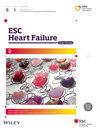METAB-HTX: prospective, longitudinal cohort study evaluating cardiac and systemic metabolism after heart transplantation
Abstract
Aims
Heart transplantation (HTX) is the treatment of choice for advanced heart failure. Still, long-term survival needs to be improved. Recent studies showed that obesity and type 2 diabetes (T2D) as well as impaired renal and liver function are associated with mortality post-HTX. There are many open questions including (i) optimal metabolic surveillance post-transplant, (ii) association of metabolic deterioration and cardiac function, (iii) association with hepatic and renal deterioration, and (iv) optimal timing and choice of treatment. The METAB-HTX trial will address these open questions, hypothesizing that metabolic deterioration post-HTX is associated with impaired cardiac function and survival.
Methods and results
METAB-HTX is a prospective, longitudinal cohort study, enrolling 400 patients post-HTX in a period of 5 years. Time-series, deep cardiac, and metabolic phenotyping will be conducted. Cardiac function will be analysed by echocardiography as well as serial cardiac magnetic resonance imaging and spectroscopy (cMRI/MRS). Coronary angiography will be conducted to assess both macrovascular and microvascular coronary allograft vasculopathy (CAV). To evaluate allograft rejection, endomyocardial biopsies will be taken. Metabolic alterations will be investigated by (i) glucometabolic phenotyping including serial oral glucose tolerance tests, homeostasis model assessment, T2D endotyping, and muscle biopsies in selected cases; (ii) lipid disorders will be evaluated by classical lipid measurements in combination with evaluation of HDL function, plasma membrane lipid composition, fluidity analyses of circulating cells and MRI/MRS for adipose tissue distribution, and ectopic fat analysis. Kidney and liver function and structural alterations will be evaluated. Complex analyses will be conducted to evaluate (i) myocardial substrate utilization and energy metabolism by cardiac and circulating cell respirometry, (ii) impact of genetic (including immunogenetic) and transcriptomic factors by third- and fourth generation sequencing (short- and long-read sequencing), (iii) circulating signatures of future neoplasia by single-cell sequencing of circulating leucocytes, and (iv) evaluation of thromboinflammation in association with heart transplant events. The primary endpoint will be the incidence of heart transplant events, defined as worsening of systolic or diastolic left ventricular function, CAV, allograft rejection, worsening of kidney function, metabolic liver disease, infections, neoplasia, deterioration of glucose and lipid metabolism. Secondary outcomes include hospitalizations related to primary endpoints, re-HTX or ventricular assist device, cardiovascular mortality, and all-cause mortality.
Conclusions
The METAB-HTX trial will identify early metabolic alterations potentially impairing cardiac function and outcome of HTX patients. This will identify patients at risk and allow precise planning of interventional trials to treat metabolic alterations post-HTX and improve outcome.


 求助内容:
求助内容: 应助结果提醒方式:
应助结果提醒方式:


